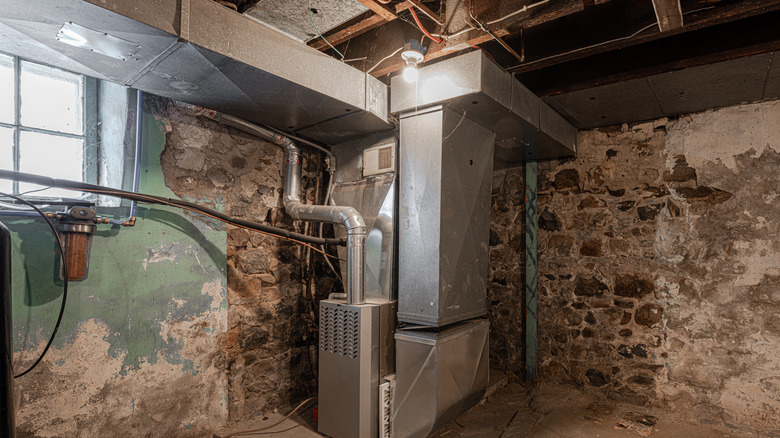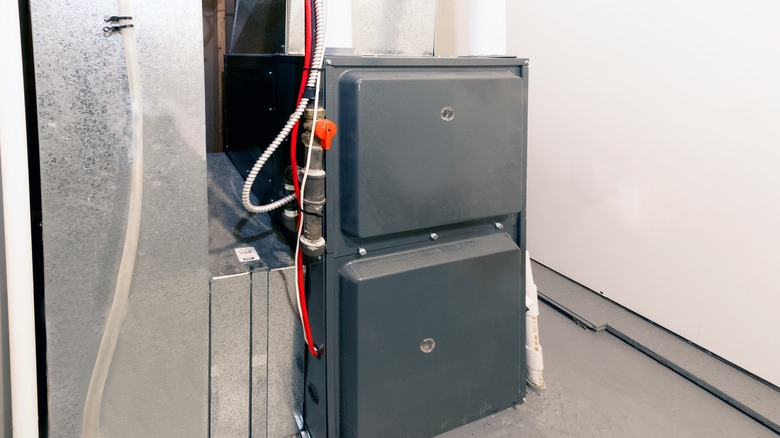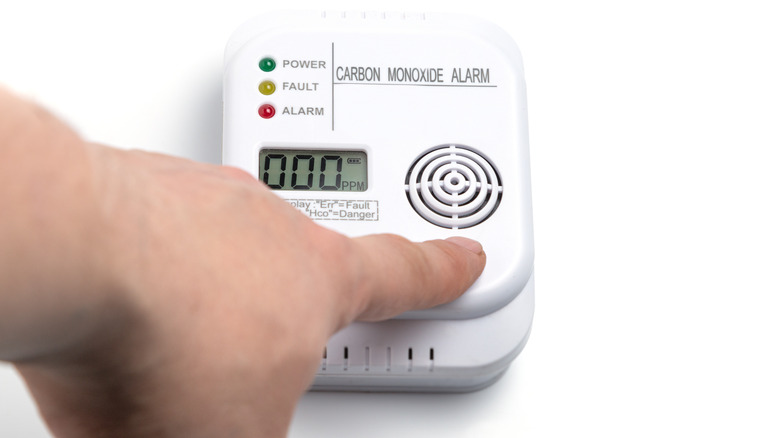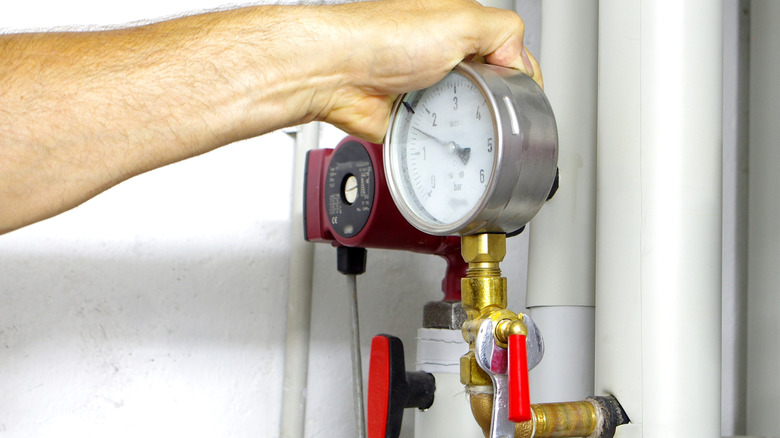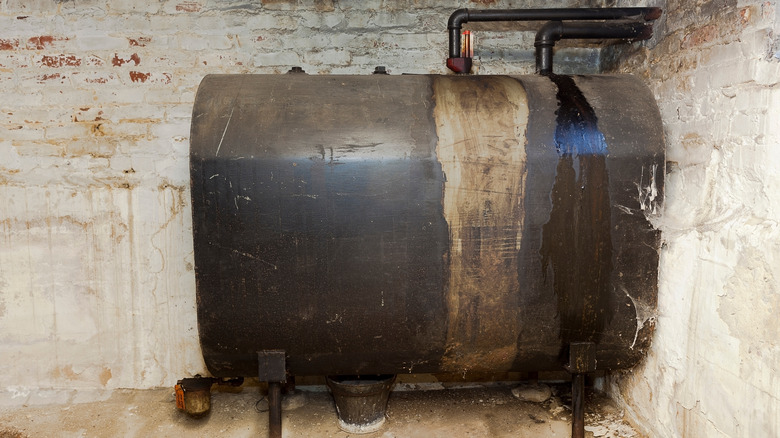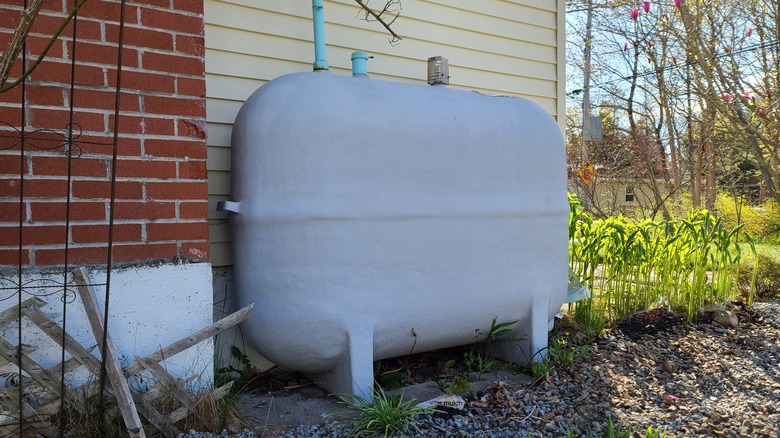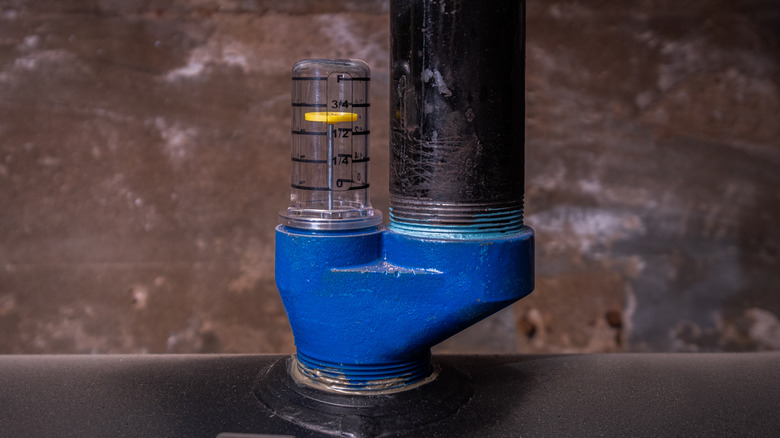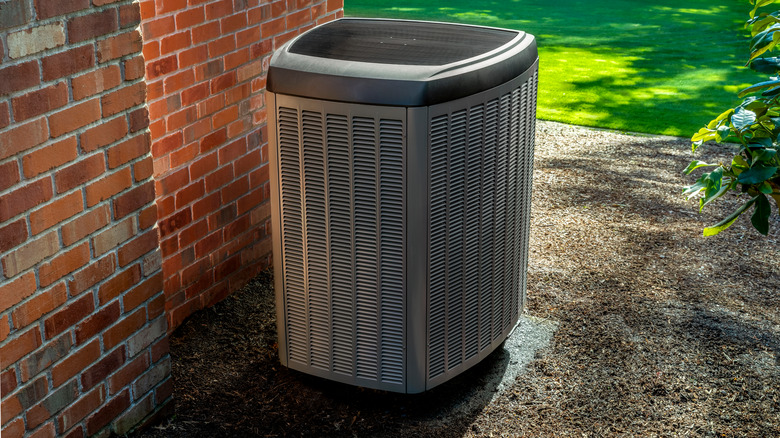What You Should Know About Oil Heating Before Buying A House
There are so many things to consider when buying a home. As a prospective buyer, you need to consider the home's layout, the condition of the roof, the age and condition of all the appliances, and so much more. Another very important thing you'll want to consider is the home's heating source. The heating system in a home may be powered by natural gas, electricity, or oil.
If you've never lived in a house with oil heat, but are considering purchasing a home using this type of heating system, you may have some big questions about how everything works, how much you can expect to pay to keep your home warm during the winter, the maintenance that will be required to keep the system running properly, and whether oil heating is even a safe option for a home. Indeed, there are several things you will want to know before signing on the dotted line and purchasing a home with oil heating.
How does oil heating work?
Before you buy a home that uses oil heating, you'll want to start with the basics. One of the first things to understand is the various parts of an oil heating system and how they all work together to warm up a home. As you probably know, an oil tank is required for homes that rely on oil heating. This tank offers a space to hold the oil that will be used to heat the system. Many oil tanks are located inside a home, typically on the lowest level, while others can be outside or even buried below the ground.
Oil heating systems have a fuel pump. This part of the system is responsible for moving oil to the combustion chamber when it is required for generating heat. As you can probably guess, the combustion chamber is the space where the oil is lit on fire. The oil from the tank also flows through a filter to remove any debris before it is pumped into the combustion chamber. A thermostat is another important part of an oil heating system — as it is for other types of systems as well. It has to monitor the room temperature and turn the system on if the temperature in the room drops below the level that has been set.
It is the heat from the oil burning, not the actual burning oil, that heats the home. Different systems work in varying ways. Some take the colder air from inside the house and pull it into a heat exchanger, warming it up before releasing it back into the home. Other systems push heated water through several pipes around the house, sending warmer water to the radiators or baseboard heaters to warm the home.
Is oil heating safe?
One of the biggest concerns some individuals have after hearing that a home has oil heating is whether it will pose a safety risk. Their mind may wander to the fear of oil fumes or fires in the home. However, the good news is that oil heating is actually quite safe. Oil won't burn unless it is inside the special heating furnace. This means that your oil tank isn't at risk of being engulfed by flames or causing a major house fire. Moreover, oil is also non-toxic.
There is always a risk of carbon monoxide in homes with oil or gas heat. The release of carbon monoxide is unlikely, but it is still important to make sure you take measures to protect yourself and others in your home. Installing carbon monoxide detectors can help alert you to a potential leak and give you time to get out of the home and contact the fire department. In many cases, you may be able to identify signs of a carbon monoxide leak before the detector goes off. If you notice smoke, strange odors, or soot, it is a sign that you should leave the home and contact a professional right away.
Is oil heating bad for the environment?
There are a few different things to consider when assessing whether oil heating is bad for the environment. On one hand, heating oil is a very energy-dense fossil fuel. Compared to other types of fossil fuels, it has the highest amount of energy stores based on volume. With advancements in oil-burning technology, the oil burned to heat homes is 90% cleaner than it was several decades ago. In fact, less than half of one percent of particulate emissions can be attributed to heating oil.
However, the actual burning of oil is only one piece of the equation. The extraction and transport of oil has the potential to cause negative environmental impacts. For example, removing oil from the ground can sometimes add toxic particles to drinking water. Moreover, any time there is an oil spill, it threatens our oceans and wildlife. Oil is not a renewable resource and may not be the best choice if you're looking to limit your environmental footprint as much as possible.
Is oil heating more expensive?
Heating prices can vary based on several factors. These can include how frigid the outdoor temperatures are during any given year, what the thermostat is set to, and the size and layout of the home. There are also some fluctuations from one year to the next in the cost of different fuel types, including oil, natural gas, and electricity. For these reasons, it is not easy to pinpoint exactly how much you'll spend to heat your home. However, when you look at the costs and trends from prior years, you can get an idea of which heating systems are more or less expensive.
Heating a home using oil heat is often more expensive than using alternative fuel sources. Natural gas is typically the least expensive option. A geothermal heat pump is next, followed by an air source heat pump. Having a fuel oil furnace is generally the most expensive option, costing a little more than an electric furnace.
If you purchase a home with oil heat and want to take steps to lower your heating bill as much as possible, there are a few things you can do. Paying attention to how the thermostat is set and lowering the temperature overnight or when you'll be gone for the day can play a huge role in cutting your costs. Even more efficient could be investing in a smart thermostat that you can program to lower the temperature in the home when you'll be gone all day at work or school, and then heat it back up as you're getting ready to come home.
What type of maintenance do oil heating systems require?
As with other types of heating systems, proper maintenance of your oil furnace is important. Failing to properly maintain the furnace could lead to costly repairs down the road. As a general rule, look to service your oil furnace a minimum of once every year. In areas with extremely cold temperatures where the furnace runs more frequently, opting for two services each year may be a better idea. When your system is serviced regularly, not only will it be safer to use, but it can also be more efficient. Another benefit of regular service is being able to maintain proper airflow throughout the home to keep everyone comfortable
There are several steps involved with servicing an oil heating furnace and system. These include removing debris and soot from the combustion chamber, checking the flue pipe, changing the oil filter and air filter, testing the burner and evaluating how efficient it is, and cleaning the vents in the floors of the home. Unless you are trained and know what to look for, it is best to hire a professional to complete these maintenance tasks for you. A trained technician will also be able to identify potential problems and point them out to you. This can help you get ahead of required repairs and prevent something minor from turning into something major if it doesn't get addressed.
How long does an oil tank last?
The furnace is one important component of an oil heating system. The oil tank is another integral part. Knowing how long an oil tank is likely to last can help you budget and plan for a replacement. The life expectancy of an oil tank can vary based on where it is placed. Indoor, above-ground oil tanks have the longest lifespan, lasting about 25 years on average. Outdoor above-ground tanks will also last a long time, though not quite as long as an indoor tank. Finally, underground tanks tend to have the shortest life span, lasting just 15 years on average.
Being aware of some of the warning signs of a failing oil tank can help you act proactively to get a replacement. Some things to look for include condensation on the outer edge of the tank after it was refilled, tiny leaks in the casing, lots of rust, corrosion, denting, and blistering on the base of the tank. If your system suddenly starts consuming more oil than is typical, it can also be a sign that something is wrong and that the tank may be leaking.
Can you move an oil tank outside?
If you're looking at potentially buying a home with oil heating, you may be wondering whether it would be possible to move the oil tank outside. Oil tanks are unattractive and can take up a lot of space that could be used for storage or other needs. It is possible to move a tank outside — or have your next tank installed outside, even if your current tank is inside. However, after learning more about this prospect, you may decide that it is not actually the best choice for your (potential new) home.
Oil tanks that are installed outside tend to require replacement sooner than those that are kept inside. By being constantly exposed to the elements, the tanks are more likely to rust or become damaged. The tank may also settle into the ground over time, which can leave them unstable. On the other hand, tanks that are left inside remain away from rain, snow, wind, and other elements. They also aren't exposed to major temperature shifts, as happens with outdoor tanks.
You will have to weigh your priorities to help you decide where you want to put your next oil tank. It is also important to consider what would happen if the tank were to leak. While an oil leak outside would not be good, one inside could cause serious damage to your belongings.
How often do you need to order more oil?
There is no set schedule for ordering more oil for your oil tank. The rate at which you go through oil can vary based on the outdoor temperatures, how warm you keep your house, the quality of your home's insulation, and more. While you cannot determine exactly how quickly you'll consume the oil in your tank, you can start to get a good estimate by monitoring your usage. Once your tank drops to about one-quarter full, you should contact your supplier to schedule a delivery for more oil — you don't want to let it get too low and end up using the rest of the tank before more can be delivered.
You can also do some math based on average usage based on the outdoor temperature. For example, on warmer days when the temperature is around 50 degrees, most systems only use about two gallons of oil every 24 hours. This means that 25 gallons should last about 12 days or so. However, when the temperature outside is significantly colder, say just 15 degrees, your system could require about 7.8 gallons of oil over the course of 24 hours. This would mean that 25 gallons would only last for about three days.
Can you convert a home with oil heat to electric or natural gas?
If you would prefer not to use oil heating, but love everything else about the house you're thinking about buying, you do have the option to convert to electric heat or natural gas heating. As mentioned previously, oil heating is generally more expensive than both electric and natural gas, which is a reason some homeowners choose to convert to a different heating system. Oil is also a non-renewable resource, so some people looking to lessen their environmental impact may be seeking an alternative.
To decide whether natural gas or electric is right for you, have a discussion with a local heating and cooling company. They can offer more tailored advice based on your specific situation. There are pros and cons to weigh for each system type. For example, natural gas is among the least expensive options and is regarded as the cleanest type of fossil fuel. However, it is still a fossil fuel. Moreover, if you don't already have a natural gas line running to your home, that will be an additional expense. There is also always a slight risk of carbon monoxide leads with natural gas heating.
Converting to electric heat won't require any additional lines being run to your home since your home already has electricity. You won't have to worry about carbon monoxide poisoning because an electric heat pump does not burn any fuels to warm a house. However, while electric heat is typically less expensive than oil heating, it is generally more expensive than natural gas. If the power goes out, your heat will also stop working until the power is restored.
